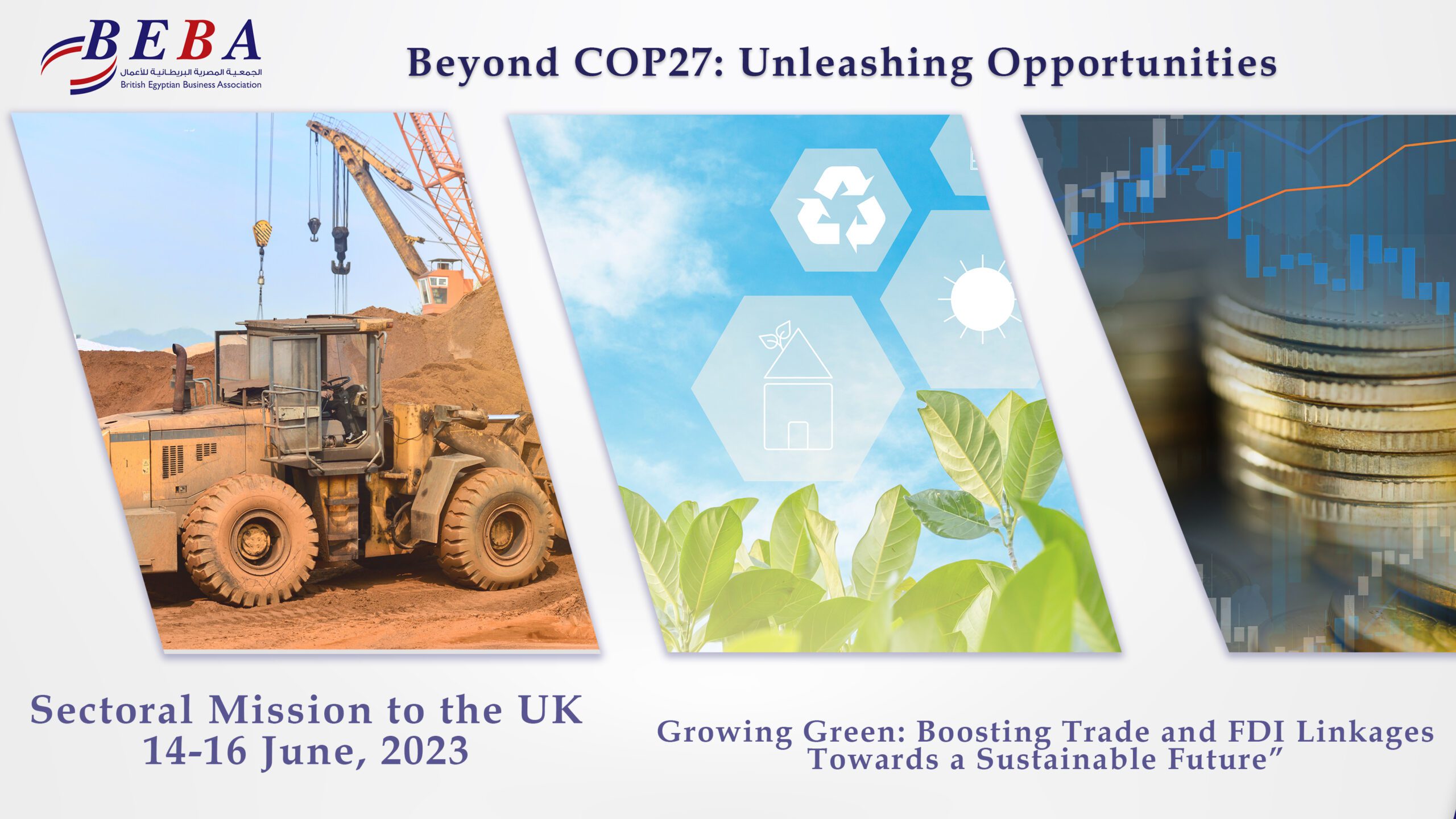
On June 14-16, 2023, the British Egyptian Business Association (BEBA) is organising a sectoral mission to the UK entitled: Growing Green: Boosting Trade & FDI Linkages Towards a Sustainable Future to discuss with UK partners, the outcomes of COP27 that represented a critical opportunity for Egypt to promote its domestic agenda on climate action, as enshrined in its ambitious Vision 2030.
During the three-day mission, Egyptian Ministers; Minister of Petroleum & Mining, HE Tarek el Molla; Minister of Finance, HE Dr. Mohamed Maait; Deputy Governor of the Central Bank, Rami Aboul Naga and business leaders will gather in London to explore ways of advancing climate-driven policies through UK-Egyptian cooperation and investment in strategic sectors including Green Finance, Decarbonisation, Hydrogen, Mining, and Financing in Decarbonisation. Moreover, there will be plentiful opportunities for networking and B2B engagement across the three days.
With the ongoing global shift towards reducing carbon emissions and producing green energy sources in the past couple of years, Egypt, recognizing the significance of this shift, has undertaken substantial efforts to promote decarbonization and embrace renewable energy solutions. Primarily, the country launched in May 2022, Egypt’s National Climate Strategy 2050, which envisions a reduction in carbon emissions, increased use of renewable energy sources, and the production of green hydrogen at a cost of $1.7 per kg by 2050.
With the green hydrogen strategy on the verge of being released, Egypt is working on developing streamlined policies and incentives to attract even more investments, as well as considering the introduction of tax breaks beside prioritizing ammonia in port access as per the recommendations of industry experts.
Major Topics for Discussion during the sectorial June mission include:
1. Innovative Financing for the Green Economy
Emerging markets need outside support in developing climate-friendly projects. What does this mean for investment? How can green financing initiatives help deliver clean and reliable infrastructure projects with environmental, social and governance (ESG) considerations in mind? What role do innovative financing instruments, such as green bonds, play? And how can we better incentivise the transition to a green economy?
2. Decarbonisation
Climate change is an undeniable reality, and when coupled with the current economic hardships and geopolitical tensions, it caused further global pressure. At the same time, the world will continue to need energy for development, economic growth and enhancement of societies’ living conditions. What is important now and more than ever is not to focus on the source of energy, but rather to work diligently on reducing emissions from energy. Accordingly, Egypt’s energy sector is looking into all possible sources and technologies to fulfil both local and global energy demands in ways that are more sustainable, responsible and with reduced impacts on the climate. While supporting the transition to lower-carbon alternatives, it is critical for the Energy industry to decarbonize rapidly by accelerating scale-up of current decarbonization solutions including reducing methane leaks, venting and flaring, improving energy efficiency, expanding renewable power as well as supporting uptake of promising technologies such as CCUS.
3. Hydrogen Trajectories
Overcoming the climate change challenge necessitates exploring and scaling up all low carbon energy options in order to fulfil energy demands without compromising the need to reduce emissions. The increasing emphasis on the role of hydrogen and its derivatives as a low carbon energy source / carrier that will contribute to overcoming the energy trilemma creates a valuable opportunity for both Egypt and the UK to utilize their unique assets, infrastructure and know-how to unlock their full potential for low carbon hydrogen production. With proactive partnerships between governments, international organizations and the private sector to spur innovation and investments, low carbon hydrogen can play a pivotal role towards decarbonization by reducing GHG emissions from hard-to-abate sectors such as ammonia, methanol, iron and steel, heavy-duty trucking and refining.
4. Mining & Exploring The Egyptian Nubian Resources
The Eastern desert and Sinai are well known for their mineral abundance mostly concentrated in the rocks of the Arabian Nubian Shield (ANS), formed during a later part of the Pan African orogeny. Gold, base metals, phosphate and decorative stones are likely to hold the greatest potential in Egypt.
The Egyptian Ministry of Petroleum and Mineral Resources has set a clear vision to unlock the full potential of this area for the optimal utilization of the mineral resources as a growth and sustainable development engine for Egypt. Accordingly, solid steps have already been taken, through updating Egypt’s Mining Law, transforming from PSA to Tax and Royalty System (TSR) and launching series of bid rounds for precious metals and base metals.
Latest achievements and success stories of the mining sector in Egypt and the enablers to accelerate its development will be discussed, as well as exploring potential opportunities for collaboration with the UK to help Egypt achieve its vision.
5. Financing in Decarbonisation
Although its contribution to global GHG emissions is only marginal, Egypt is taking concrete actions to accelerate the pace of green transformation and create conducive mechanisms to contribute towards the promotion of green investments. According to Egypt’s updated NDCs issued in the run up to COP27, the financing needs required to full the mitigation and adaptation measures amount to $250 billion. Access to concessional finance remains a key challenge facing Egypt and other developing countries to accelerate decarbonization and transition to low carbon energy sources. This challenge creates a window of opportunity for governments to work with all stakeholders to develop innovative financing tools, mechanisms and solutions to bridge the financing gaps to support developing economies in fulfilling their NDCs and overcoming the escalating repercussions of climate change.
